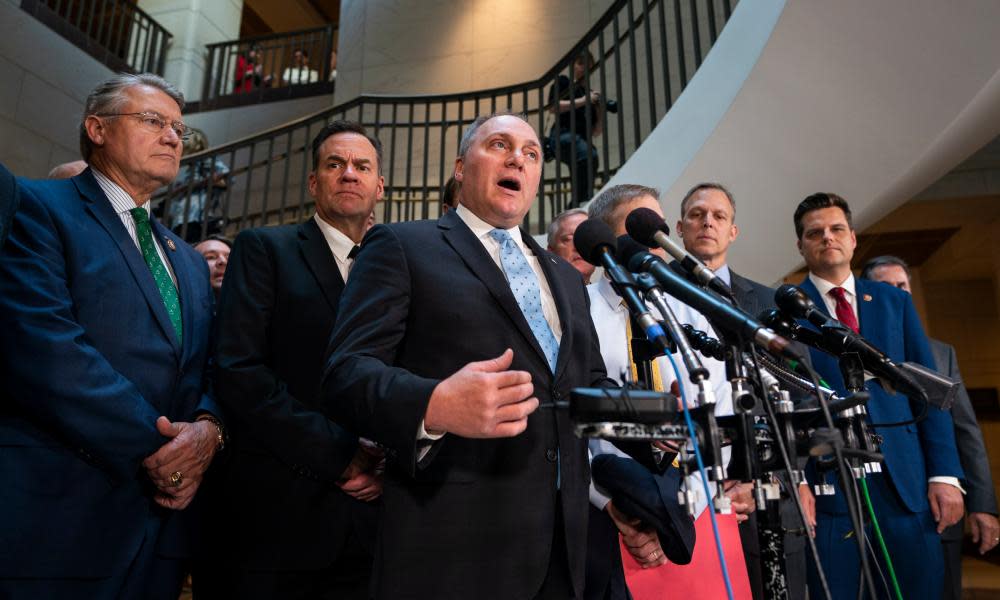This week in the impeachment inquiry: bombshell testimony and Trump fury

As a watershed week full of bombshell testimony and presidential fury at the impeachment inquiry receded, Washington is now looking ahead to another week promising bombshell testimony – and more presidential fury.
For sheer spectacle, Republicans will be hard-pressed to top an invasion last week by lawmakers of the secure area where witnesses were being questioned. And for sheer malice, Donald Trump will have to sink far indeed to go lower than his claim to be the victim of a lynching.
Republican senators have been scurrying away from reporters trying to ask about testimony last Tuesday that advanced the central charge in the impeachment inquiry, that the Trump administration had withheld military aid for Ukraine in an extortionate effort to manufacture bad news about Joe Biden.
Related: Republicans who staged the sit-in are taking obstruction literally
What could the senators say? Trump’s defenders have almost universally stopped trying to deny or defend his conduct, resorting instead to complaints about how Democrats, who are going by rules written by Republicans, were running the process.
But even more damning testimony for Trump could lie ahead, with the scheduled appearance on Thursday of the national security council senior director, Timothy Morrison.
Morrison has emerged as a key witness to conversations between diplomats and Trump himself linking the military aid and the Biden ask. Morrison had a “sinking feeling” about those conversations, he has been quoted as telling one colleague.
“I am lowering my expectations for this testimony. Highly partisan guy,” wrote Tom Nichols, a professor at the US Naval War College and notable never-Trumper. “But also, a professional who, one assumes, will tell the truth – because he had a career before Trump and would likely want to have one after Trump.”
Behind Morrison lies a potentially bigger witness, Morrison’s former boss John Bolton, who has been quoted as saying he wanted “no part of whatever drug deal” aides to the president were cooking up. Bolton resigned as Trump’s national security adviser under tense circumstances in September.
Bolton’s lawyers are working toward an agreement in which he would testify before the congressional committees running the impeachment inquiry, according to multiple reports.
“I think there is a high likelihood that the committees will turn their sights to John Bolton precisely because he was not, strangely enough in some ways, an accomplice to this,” Ned Price, a former CIA officer and national security council spokesman, told Renato Mariotti on the On Topic podcast. “He was against this. He in fact played a key role.”
With an increasing number of threats arrayed against him, and the weight of evidence piling up, Trump has become ever more reliant on the support of Republican colleagues, especially in the Senate, which has the power to remove Trump from office.
But instead of currying favor with fellow Republicans – allowing them, perhaps, to float light criticisms of him in exchange for their promise to protect him with their votes – Trump has resorted to threats and shaming, declaring Republicans who oppose him to be “human scum”.
Trump has also continued to make highly controversial moves – abandoning the Kurds in northern Syria, temporarily awarding himself federal contracts to host next year’s G7 summit – that Republicans warned made defending him increasingly difficult.
A move by the Republican Lindsey Graham to demonstrate support for Trump in the Senate on Thursday was slow to draw all the Republicans, with three – Lisa Murkowski of Alaska, Susan Collins of Maine and Mitt Romney of Utah – declining to sign on to a resolution criticizing the impeachment process now playing out in the House. About 20 Republican senators would probably be required to oust Trump from office.
Public approval of the impeachment inquiry, meanwhile, keeps climbing, with 55% approving and 43% disapproving, up from 51% approval one week prior, according to a new Quinnipiac poll backed up by polling averages.
Republicans have complained that the impeachment inquiry has not allowed the White House and other agencies to send lawyers along with testifying witnesses, and has no mechanism for Trump to call his own witnesses to mount a defense.
But as the head of the executive branch, Trump “has access to all the witnesses/documents he would need, many of which are being withheld from House Democrats”, wrote Nate Jones, a former national security council and justice department official.
“His real problem: the facts are indefensible.”
Other expert observers agree with that analysis.
“President Trump’s substantive defense against the ongoing impeachment inquiry has crumbled entirely – not just eroded or weakened, but been flattened like a sandcastle hit with a large wave,” wrote the Brookings Institution senior fellow Benjamin Wittes in Lawfare. “The only defense that remains to the president is that it does not amount to an impeachment-worthy offense – an argument difficult to square with either the history of impeachment or its purpose in our constitutional system.”

